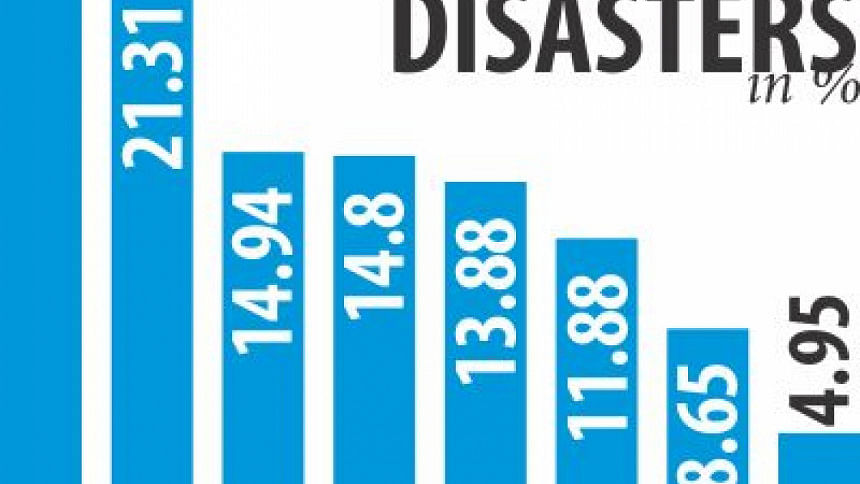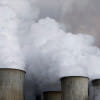18,424cr loss in 6yrs

The impact of climate change and natural disasters cost 43.61 lakh Bangladeshi households in disaster-prone areas Tk 18,424 crore between 2009 and 2014, said the Bangladesh Bureau of Statistics yesterday.
In its first ever study on losses in calamities, the state agency released the report “Bangladesh Disaster-related Statistics 2015: Climate Change and Natural Disaster Perspective”.
The report said the agriculture sector suffered a loss of Tk 8,841 crore, 48 percent of the total loss.
During the period, crops of 36.2 percent households surveyed were lost, livestock of 4.76 percent, poultry of 1.21 percent, fisheries of 5.82 percent, land of 26.72 percent, and houses, kitchens and cattle sheds of 17.19 percent and trees of 8.10 percent households were damaged.
“Formulating effective plans and their implementation is imperative to facing the impacts of the natural disasters,” said Planning Minister AHM Mustafa Kamal while releasing the report at the National Economic Council auditorium.
The report said if there were no losses due to natural disasters at the household level, the gross domestic product output would have grown by 0.30 percent a year on average.
The BBS survey found that 74 percent of the households received financial assistance from the government, 15 percent from NGOs or international organisations, four percent from the rich, three percent from business firms and two percent from relatives and friends.
The BBS surveyed 143,980 households of 43.61 lakh in disaster-prone areas. About 2.2 crore people live in these disaster-prone areas, accounting for 12.64 percent of the population.
Among the causes of the natural disasters, flood was a major cause for losses, eating up Tk 4,280 crore. River and coastal erosions caused a loss of Tk 3,640 crore. Loss due to cyclones stood at Tk 2,838 crore.
Atiq Rahman, executive director of the Bangladesh Centre for Advanced Studies, a research organisation based in Dhaka, said the survey was a good beginning and pioneering initiative as it was based on a comprehensive database.
He, however, pointed out it had loopholes. He claimed that the damages to households revealed were six to 10 times less than the actual loss.
He said the survey was an attempt to calculate the damages to only one component, households, among six components. “This is an incomplete representation.
“The figure is incorrect, and should not be used as it will be misleading. The damage caused to households was taken into account.”
He said the other components were infrastructure, health, the ecosystem loss and income.
The internationally acclaimed environmentalist suggested calculating the total damages caused by the natural disasters.
“So, it has to be complete for any serious decision making,” he told The Daily Star over phone.
The environmentalist said the survey should be widened, carried out every five years and made complete, as annual data does not give the actual picture.
He said Bangladesh's disaster risk reduction and climate change adaptation have to be integrated, instead of dealing with them separately. “And disasters will only increase, and the cost of future damages will also increase.”

 For all latest news, follow The Daily Star's Google News channel.
For all latest news, follow The Daily Star's Google News channel. 








Comments